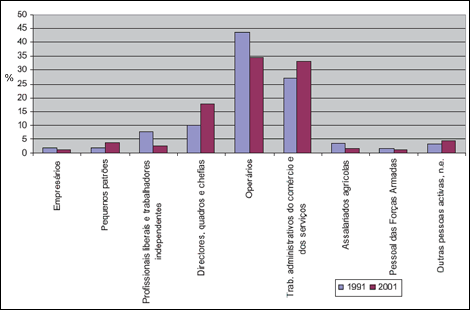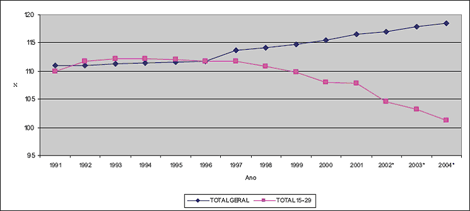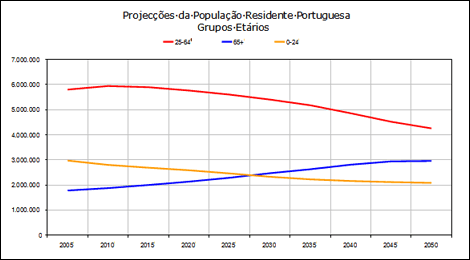
Young people recognize, as no one else does, the real meaning of words such as “excellence”, “innovation” or “social inclusion”
Speech delivered on 25 April 2007
The Green Paper on demographic change, launched by the European Commission in 2005, shows that Europe is facing unprecedented demographic change. Approximately 21 million people of working age will be lacking by 2030, whilst for each two active persons there will exist one inactive person (over 65). At that time there will be 18 million less young Europeans than exist today.
In many European countries, including ours, the age pyramid is already in reverse, placing in danger the sustainability of the social security systems, as well as a model of society that seemed to guarantee an improving quality of living and a social rise based on higher qualifications.
Between 1991 and 2004 the younger population had decreased by 8%, and no further represented ¼ of the resident Portuguese but only 1/5.
On the other hand, the qualifications of young people are shown to be growing and, although there are still rates of school abandonment of approximately 35%, the proportion of young people with qualified or management jobs has grown from 9.9% in 1991 to 17.6% in 2001.

Young active population per large socio-economic group - 1991 and 2001
Source: National Statistics Institute - Portugal
Young population shows a diminishing trend at an accelerating rate since 1996, with the growth index decreasing by 8% from 1991 to 2004.

Growth Index of total resident population and resident young population,
per year: 1991-2004 (1991=100%)
Source: National Statistics Institute - Portugal

Source: INE, Projections of Resident Population, 2005-2050 Basic scenario
The ageing of European societies necessarily leads to an intensification of the migratory phenomenon to compensate demographic deficit.
One third of the world’s young population resides in developing countries and there are multiple factors that encourage their leaving for more prosperous countries.
Also, the search for better living conditions, as a consequence of the contrast between rich and poor countries, makes a growing migratory pressure inevitable.
And economic globalization is another factor that causes available labour to journey in the direction of industrialized or more productive countries. Such journeys only lessen or delay these movements.
Finally, it should be taken into consideration that the industrialized countries also need to attract qualified labour, data processing, physicians, researchers and so on, facilitating the immigration of the better qualified younger people to the countries which will provide them with improved social and professional living conditions.
It is with this competitiveness, the mobility movements and the management of this diversity that today’s youth have to contend with to decide on their future. Closed areas or labour contracts free from this dynamism and from this competitiveness no longer exist, and collective identity itself changes intensely.
Protectionist systems are overruled by a growing interaction and intercommunion between the people, the economies and the countries, with heavy impact in the change of their own cultural references.
Young people are players in this social change and for this reason must be included as full status citizens, thus refusing the viewpoint that considers youth as only passively affected by social change.
The growing European mobility, of which the success of Erasmus is a paradigmatic example, as well as the ease of communications and the proliferation of networks through information technology, is building a new European identity.
A new market is being opened, especially for the better qualified, which forcibly brings about extreme competitiveness in the educational systems and a permanent effort in the fight against exclusion and school abandonment.
Legislation is becoming more and more European and European citizenship is fast gaining ground on the citizenship of individual countries.
The construction of a cohesive Europe, with social justice and capable to answer the concerns of today’s youth is equally a great challenge for the coming generations.
© 2006-2016 Presidency of the Portuguese Republic
You have gained access to the records of the Official Site of the Presidency of the Republic from 9 March 2006 to 9 March 2016.
The contents available here were entered in the site during the 10 year period covering the two mandates of President of the Republic Aníbal Cavaco Silva.